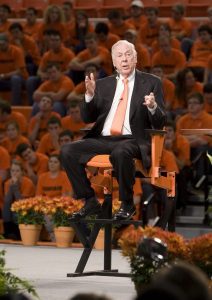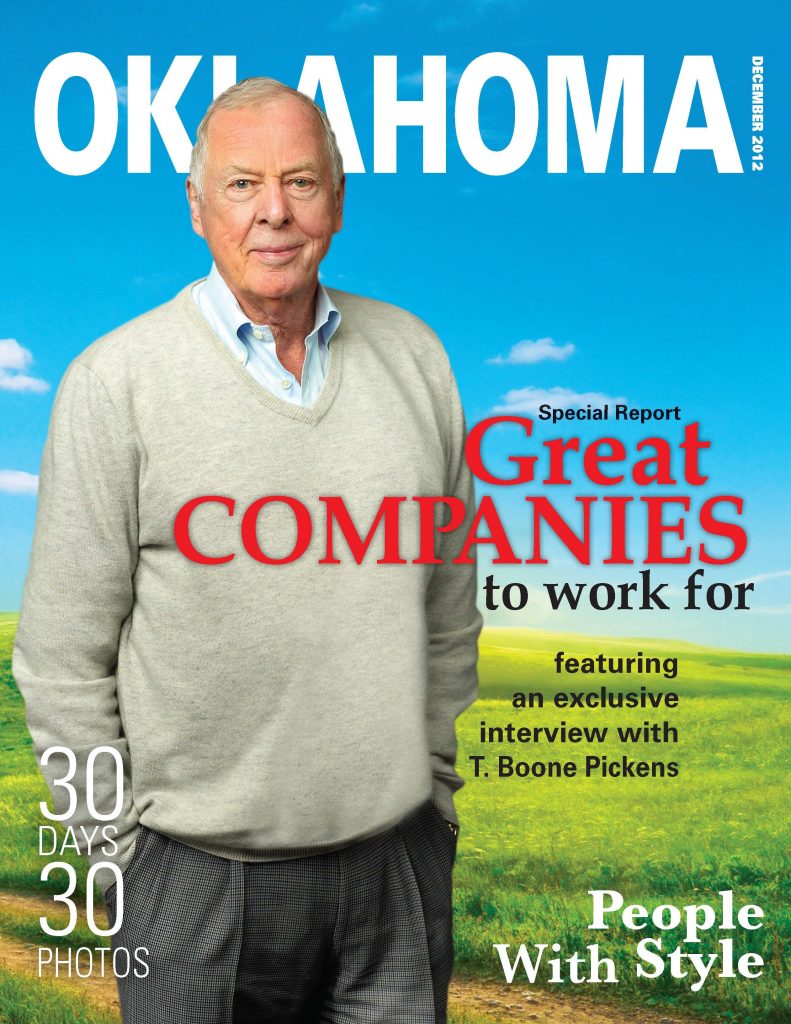Thomas Boone (“T. Boone”) Pickens remembers, there was a time when the man with the plan for North American energy independence didn’t even have a plan for his own immediate future.
Admittedly, though, that was a long time ago.
[media-credit name=”Photo courtesy Oklahoma State University” align=”alignleft” width=”291″] [/media-credit]
[/media-credit]
“It was February 1949 and my dad was standing with me in front of my fraternity house in Stillwater,” Pickens recalls. “He said ‘Your mom and I are concerned that your plan is not our plan.’ I thought I knew where he was headed. He said, ‘Your mom and I have a plan for you to get out of college in June 1951. I’m not sure you’re on the same schedule.’ I said, ‘Probably not.’ So he tells me, ‘A fool with a plan can beat a genius with no plan. I’m concerned we have a son with no plan. You get into school and you get out in 1951.’
“So then he slapped me on the arm, said, ‘I love you son,’ got in his car and drove off,” Pickens continues. “I’ll tell you what, that was at turn of semester. A week later I had a plan. I got into geology and graduated in June 1951.”
Until that moment, Pickens might not have had a plan, but what he did have was a tough legacy hewn from the rough country of Depression-era Oklahoma and a history that already seemed to auger no-nonsense, hard work-driven success. It all started with that plan. Has Pickens had plans ever since?
“Damn right,” he says.
The Making of the Man

It took all of nine months for Pickens to distinguish himself from those previously born in his hometown of Holdenville, Oklahoma. And those months were in-utero. It was May 1928, and as Pickens’ mom was about to give birth, doctors declared there were complications and that they could only save Grace Pickens or her unborn child. Pickens’ dad, Thomas Sr., a petroleum landman, refused to accept those as the only choices. So, instead he prompted a doctor to study a couple of text pages on Caesarean section deliveries. What followed was both the successful birth of Pickens, the survival of his mother and the first C-section ever performed at Holdenville Hospital.
The United States into which he was born was on the precipice of its greatest economic collapse to date, and Pickens grew up a child of the Depression – although he didn’t see things that way at the time.
“People consistently have asked me what it was like living in the Great Depression,” Pickens says. “I didn’t have anything to compare it to. As far as I was concerned it was good. It was simple, but it was good. We lived in a small town of 5,000 people. My grandmother and aunt lived next door to me and my aunt was my school teacher.
“I grew up having a job, which couldn’t have worked out better for me – it sustained me moving forward,” Pickens adds. “I think there are a lot of young people who are the same way and can be propelled by their work ethic. There is a very good work ethic in Oklahoma.”
Honor, honesty and the dignity that comes with work were key elements of Pickens’ upbringing. His business acumen developed early as he transformed a 28-customer newspaper route into a 125-paper operation by acquiring other deliverers’ routes. Integrity was driven home when, on one occasion, he found and returned a newspaper client’s lost wallet and accepted a $1 reward for the effort. When he returned home, his family insisted he return the dollar.
“Sonny, take the dollar back,” Pickens’ grandmother told him. “We’re not going to get a reward for being honest.”
Pickens was 16 when his father, who worked then for Phillips Petroleum, was transferred to Amarillo. He completed high school there, and then spent one year at Texas A&M University before transferring to Oklahoma A&M (now Oklahoma State University).
It was in Stillwater that the senior and junior Pickens had their fateful conversation about planning. It was also there that in 1951, T. Boone Pickens earned his degree in geology and graduated.
Then it was time for the next stage in Pickens’ plan.
The Entrepreneur Rises
[media-credit name=”Photo courtesy Oklahoma State University” align=”alignleft” width=”232″] [/media-credit]
[/media-credit]
Pickens worked for Phillips for three years before borrowing $2,500 and, with two investors, forming an oil and gas firm called Petroleum Exploration Inc., which focused on domestic oil and gas opportunities. Later he would form Altair Oil & Gas Co., and then Mesa Petroleum, which he took public in 1964. Pickens led the company to the apex of the independent oil and gas sector.
“When you start a company like I did, you start on a shoestring – you’re not going to do a lot of planning, like where you’re going to be in 10 years,” Pickens says. “You don’t know where you’re going to be in 10 months. You think in pretty short terms. After you’ve established something, you know you’re now going to be successful, then you can start planning for 10-20 years out. Then when you start hiring people, they know they’re going to have a job and be successful and going to stay a long time.”
As he progressed to national and international prominence, Pickens revolutionized an approach that today is considered an intrinsic component of business. He decried the focus of so many on taking small, prudent steps and instead championed bold moves to maximize shareholder value.
It was hardly the only way that Pickens became a transformative, if not revolutionary, figure in American business. In the 1980s he challenged the major oil companies and business in general to dramatically restructure to meet changing times. An epic bid by Mesa and an investment group for Gulf Oil was a shot across the bow, and eventually the reforms he proposed did come to the oil industry.
Around the same time, Pickens emphasized physical fitness at Mesa and – well ahead of today’s fitness craze – the company was named “The Most Physically Fit Company in America” in 1985.
Pickens also helped open up new international markets and brought attention to U.S. investment abroad and to antiquated market models overseas.
Through ups and downs, successes and not, criticism and acclaim, Pickens says that his values never changed. To an extent, he says he figures they never could change.
“I don’t think you have to struggle to maintain your values – they’re part of you,” he says. “It’s how you operate, not something you have to think about. Now are there some sorry guys I did business with? Yes – once!”
Pickens says the keys to success are a good education, work ethic and “maybe getting lucky every once in a while.
“It seems like when you’re working hard, things happen,” Pickens continues. “It’s like in football. When you’re working hard you have a lot better chance of recovering a fumble.”
He admits to having lost a few in addition to the numerous challenges he’s overcome.
“Nobody wins them all,” Pickens says. “The guys that hit the most home runs also strike out the most. I like to go for the fences. Sure, I’m going to strike out, but I am going to hit some home runs, too. I could talk all day about strikeouts, but I don’t tend to focus on those.”
Pickens left Mesa in December 1996, but that barely impacted his profile or the respect he commanded. His imprint in other areas became more notable as well. Pickens is a noted environmentalist and outdoorsman who preserves his own massive tracts of ranch land and helped protect underground water reserves in Texas. He supports environmental, medical and youth-at-risk charities and endeavors – and makes it very clear in person that this is not just obligatory check-writing support. To date, he is responsible for more than $1 billion in targeted giving, with the total increasing regularly. He founded the United Shareholders Association (USA) to help reform the unbalanced relationship between shareholders and management.
In Oklahoma, of course, Pickens is often viewed as an influential factor in the ascent of Oklahoma State University, where his name graces a stadium and other campus sites. He has given more than $500 million to his alma mater, split almost evenly between athletics and academics. His passion for OSU is legendary, and his explanation well represents his life’s themes.
“I got a good education there,” Pickens explains. “But at the same time, I’m very competitive; I don’t like to lose. I hated to see OSU as the second large school in the state. OSU is where the guys who come from small towns like I did go to. The University of Oklahoma seemed to be where the people from Tulsa and Oklahoma City went.
“We had a long way to go to become competitive in some areas,” he continues. “OSU excelled in some already, without a lot of money, just from hard work and good leadership. I thought if they were going to compete, they should do so at a higher level. So I decided to give them money and to follow the money to see that it was used wisely. I feel like I’ve got my money’s worth. But I am not through giving to OSU.”
Tomes could be written on Pickens’ interests and accomplishments. However, outside of the business world and a grateful campus in Stillwater, Pickens might be best known for something other than a personal or business plan. A few years ago, he introduced a little plan that, countless supporters believe, would lead to energy independence for North America and leave the country free from the threat of distant oil barons and petroczars.
The Pickens Plan For America
 On July 8, 2008, Pickens announced The Pickens Plan, which proposed reducing dependence on OPEC oil by, among other things, creating a “wind corridor” in the Great Plains and also emphasizing natural gas. Although criticized because of his own investments in natural gas and wind technology, the plan has engendered support from many business and political leaders on both sides of the ideological aisle.
On July 8, 2008, Pickens announced The Pickens Plan, which proposed reducing dependence on OPEC oil by, among other things, creating a “wind corridor” in the Great Plains and also emphasizing natural gas. Although criticized because of his own investments in natural gas and wind technology, the plan has engendered support from many business and political leaders on both sides of the ideological aisle.
While the plan has not been adopted federally, it is still a plan – and that’s something, considering that no United States president has ever presented an energy plan. That’s something Pickens laments when he ponders the state of energy today.
“The only energy plan was for cheap gasoline, and because the nation had that, there has never been an energy plan,” Pickens says.
According to Pickens, any energy plan would start with understanding the nation’s portfolio of energy resources – a portfolio that is much larger and practical than many might know or want to admit.
“We could be off of Middle East oil very quickly and diminish the power of OPEC,” Pickens says. By converting the nation’s eight million strong 18-wheeler fleet to natural gas, the U.S. could cut three million barrels of oil a day from the 20 million barrels utilized nationwide daily.
“Only four (million) of those 20 million barrels come from OPEC, and only half of that four comes through the Strait of Hormuz,” Pickens says. “Converting 18-wheelers to natural gas alone could eliminate our need for oil from the Middle East.”
There are numerous other components of the elaborate plan, but Pickens says that until the price of natural gas rises, developing the wind power aspect of a plan for energy independence simply won’t happen.
“You could do wind deals when natural gas is at $6, but when it’s dropped to $2, wind just won’t work,” Pickens says. “You price energy on the margins, which is natural gas. When natural gas is cheap, it makes it very difficult for wind and solar.”
Pickens says that he believes former Republican presidential candidate Mitt Romney had a plan in place – America’s first energy plan – and that it would have worked. He says also was asked to speak to President Barack Obama, spent an hour and half explaining energy and energy markets, but walked away unimpressed.
“He doesn’t understand markets,” Pickens says. “If the White House understood that the economic recovery will be on the back of cheap energy…but the Obama Administration never figured that out. The Administration doesn’t like energy companies. And here we have the cheapest energy in the world? What does he want? He can’t even tell you because he doesn’t understand how it works. The President has a disdain for the industry. He thinks he can solve energy problems with renewables – wind and solar. We all know the wind doesn’t blow all the time and the sun doesn’t shine every day. You always have to have a base load for power generation, which is coal or natural gas.”
Pickens was bullish on a potential Romney Administration, but remains nevertheless optimistic about the nation’s energy status. Yes, gasoline prices will continue to rise along with other energy prices. However, that profitability will then open up economically viable alternate sources.
Oklahoma – a state clearly still close to Pickens’ heart – is poised to be an important player in the nation’s energy future.
“I think the oil industry has an incredible future and Oklahoma is right in the middle of it,” Pickens says. “Ten years ago, I made speeches to schools, and I couldn’t make statements like I can today – that (students) have long and successful careers ahead of you if you’re willing to work hard.”
Life Lessons and Legacy
T. Boone Pickens is still working hard. At 84, he presides over BP Capital Management from its Dallas office, and fierce intellect still smolders in his eyes. He has many other interests, as well. He says he still has things to accomplish.
“I want to make more money and be generous with it – give it away,” he says. “I’ve got my estate pretty well set, but we’re drilling up in Kansas, and I want to see that developed. There are still some things in medical research … we’re looking at a very big deal that might or might not happen.
“I don’t believe you make your children rich,” he continues. “I’m not going to make my kids rich people. I’ll help them if they want. I’ll show them how.”























